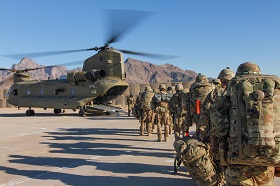Technology and innovation are common themes that can potentially foster dialogue between the U.S. and Russia through alternative means in the current geopolitical and global economic environment.
The re-shaping of the US-Russia Cooperative can be a gateway for the two countries to work together and build trust without compromising their core values. In correlation with the Trans-Afghanistan Pipeline (TAPI), a stable Afghanistan serves both Russian and U.S. interests concurrently by countering terrorism and drug trade, as well as boosting regional stability, which in turn would support the pipeline security.
Also, the U.S.-Russian Cooperative, leaning toward energy technology exchanges, joint research and energy technology commercialization, is a crucial component to Russia/U.S. energy cooperation. Joint research in the areas of fusion energy is already taking place within the ITER project, which is an effort between 35 nations, including the U.S. and Russia, to build a fusion reactor.
Security Outlook for a Trans-Afghanistan Pipeline (TAPI) and U.S. Involvement
To identify innovative solutions for securing the Trans-Afghanistan Pipeline (TAPI) from threats and attacks, participating agencies must put together a concerted effort, relying on both physical security and diplomatic measures. Afghanistan is a crucial component for such protection due to its diverse and complex cultural and social societal aspects. The country, therefore, could be a centre of gravity for security support. Accomplishing the security of the pipeline depends on the following key elements, as observed by Chem-Energy Corporation CEO, Shuja H. Zaidi, who is of Pakistani descent.
- Increasing diplomatic and economic development support for local communities whose regions are directly involved in pipeline development. Diplomatic support should derive from countries that look to benefit from the construction of the pipeline in coordination with the United States and that maintain a physical presence in Afghanistan.
- Continuing diplomatic talks with the Taliban to develop continued support in establishing stability in the region.
- Fostering a geopolitical and economic environment that promotes a working relationship between India and Pakistan with a shared focus on the physical security of the pipeline, diplomatic efforts with tribal communities and joint coordination with humanitarian, non-governmental organizations and international finance agencies (Development Banks). This shall be done in cooperation with the diplomatic arms of involved countries and energy consortiums.
Regarding U.S. involvement in the pipeline, the response to China’s Belt and Road Initiative (BRI), which has invested considerably (approximately 1.73 Billion USD), appeared to be aimed at strategically leveraging government and private enterprise (Public-Private Partnership Development) to garner influence on control and transport of natural resources. As the U.S. maintains an evident military and diplomatic footprint in Afghanistan, its continued involvement will be vital in assisting Afghanistan in establishing a stable central government, which in turn will increase the security stability outcome of the pipeline.
Improving U.S. and Russia Collaboration on Energy Projects
Technology and innovation are common themes that can potentially foster dialogue between the U.S. and Russia through alternative means in the current geopolitical and global economic environment.
The re-shaping of the US-Russia Cooperative can be a gateway for the two countries to work together and build trust without compromising their core values. In correlation with the Trans-Afghanistan Pipeline, a stable Afghanistan serves both Russian and U.S. interests concurrently by countering terrorism and drug trade, as well as boosting regional stability, which in turn would support the pipeline security.
Also, the U.S.-Russian Cooperative, leaning toward energy technology exchanges, joint research and energy technology commercialization, is a crucial component to Russia/U.S. energy cooperation. Joint research in the areas of fusion energy is already taking place within the ITER project, which is an effort between 35 nations, including the U.S. and Russia, to build a fusion reactor.
U.S-Russian collaboration can also take place in the domain of energy development (renewable and alternative), as well as in the private sector, with a focus on joint projects to develop poverty-stricken regions where there is a need for initial energy infrastructure. There is an opportunity for collaboration in this area, with humanitarian and international NGO's developing a real working relationship and expanding both U.S. and Russian energy technological capabilities in new markets (Africa, Asia).
Robert R. Hayward II is the COO of Chem-Energy Corporation. The company is based out of Orange County, California, with its site on moving to Texas in the upcoming year. Robert is a former military officer and aviator in the United States Army, reaching the rank of Major. After his military career, he pursued international non-profit work with Mission Possible Foundation based out of Delray Beach, Florida, focusing on energy development, public health and economic development in poverty-stricken areas. Robert is currently a member of the United States Global Leadership Coalition and New Leader for the Carnegie Council on Ethics and International Affairs.






